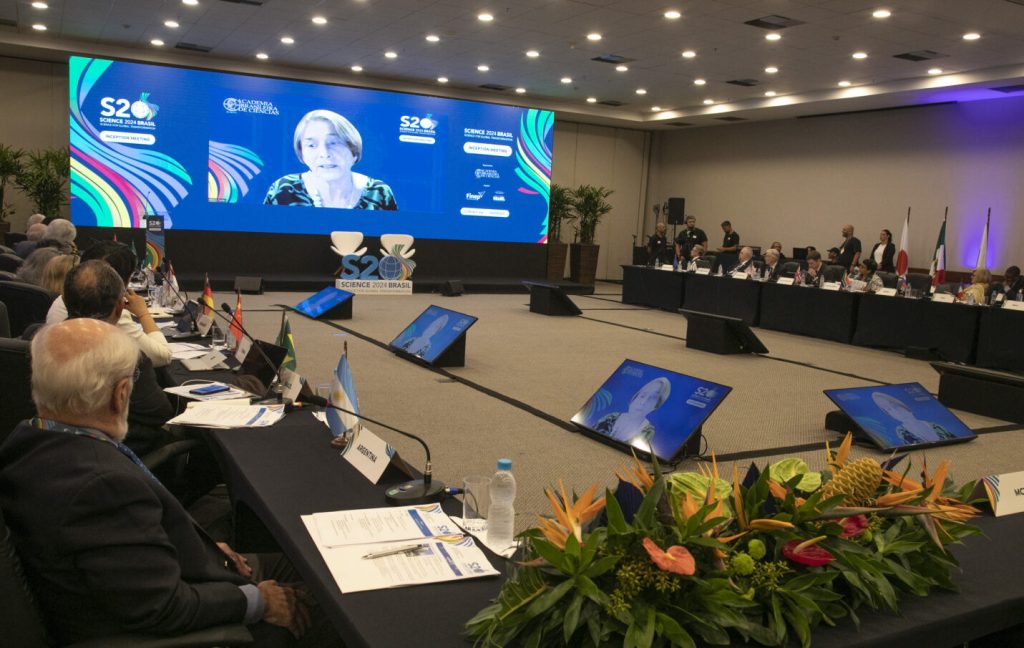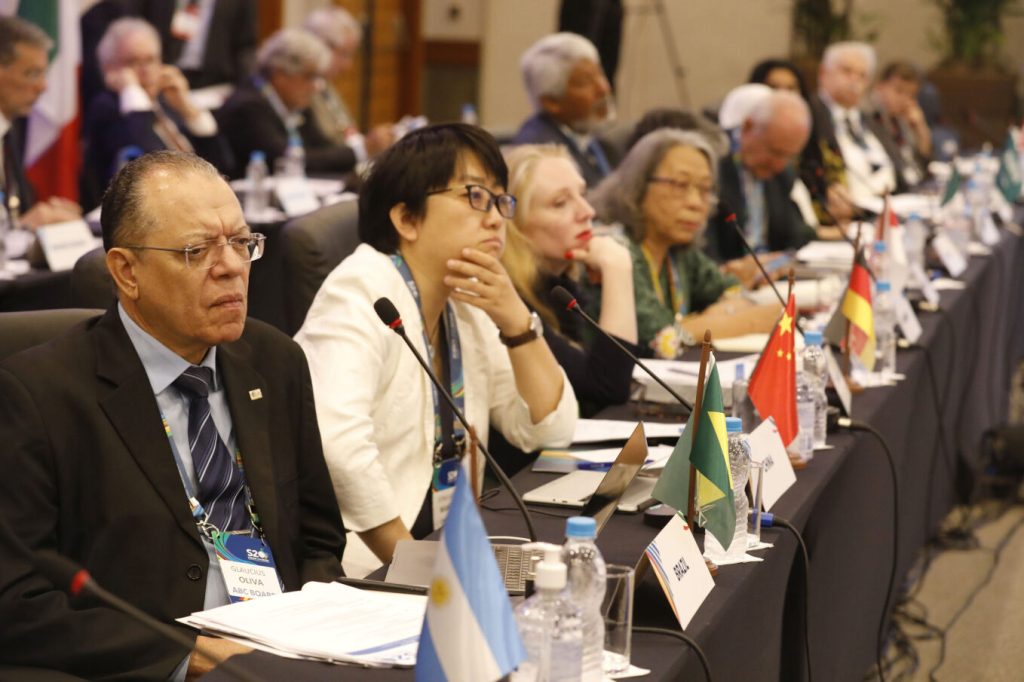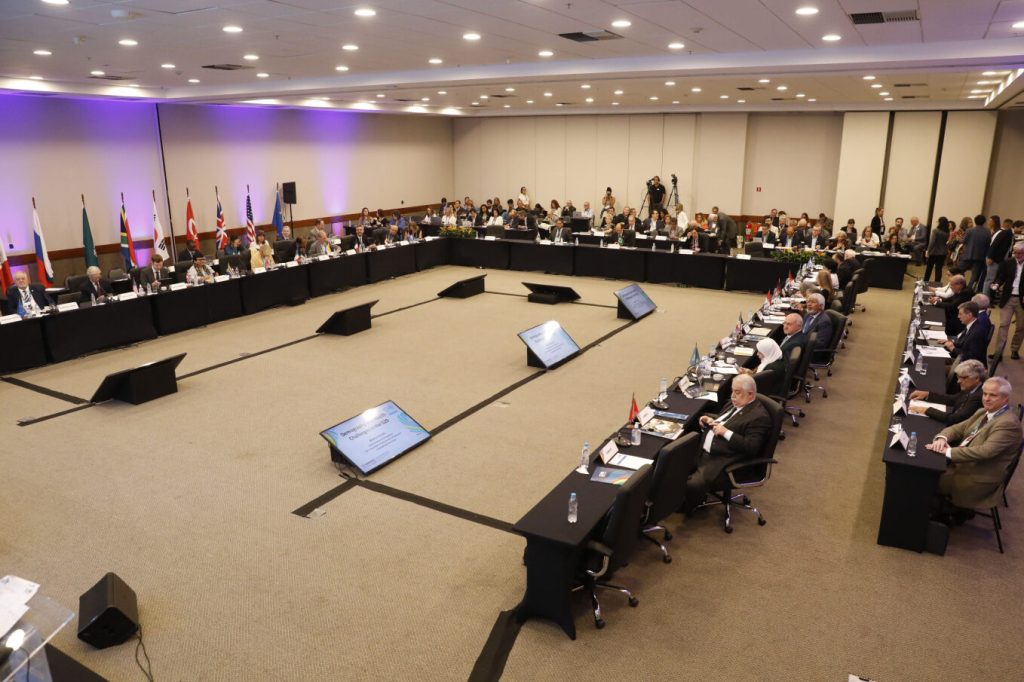What do the national academies of sciences of the G20 think?
MARCH 14th | BRAZILIAN ACADEMY OF SCIENCES
On March 11th and 12th, the national academies of science of the G20 countries gathered to kick off the Science20 in 2024. Under Brazil’s rotating presidency, the meeting in Rio de Janeiro included representatives from all G20 countries, except Russia, South Korea, and Japan – the latter two sent videos. This time, the meeting also saw the participation of the European Academy. International scientific institutions and regional networks of academies participated as observers.
Discussions at this initial meeting revolved around proposals made by the Brazilian Academy of Sciences (ABC), which, as the host of S20, suggested five main themes: Artificial Intelligence; Bioeconomy; Energy Transition; Health; and Social Justice.
The meeting was opened by representatives from two other G20 action groups – G20 Finance and G20 Social. Both emphasized the importance of different focus groups working in harmony. Tatiana Berringer, from S20 Finance, called for engagement of scientists in building truly globalized financial systems. Gustavo Westmann, from G20 Social, urged pragmatism in the elaborated guidelines and greater participation from society. “These should be legacies of the G20 in 2024,” he said.
Next, Brazil’s Minister of Science, Technology, and Innovation, Luciana Santos, greeted the attendees, signaling that the scientific priority of Brazil’s presidency in the G20 is global asymmetries in access, development, and production of research and innovation. “Developing countries are less prepared to use and adapt cutting-edge technologies such as artificial intelligence and low-carbon solutions. But there is an opportunity to embark on the nascent green transition. Our intention is to seek bridges for technological transfer between developed nations and developing countries,” said the minister.
ABC President Helena Nader opened the discussions by presenting the focal points as themes that converge with the United Nations Sustainable Development Goals (SDGs). “Concrete actions are necessary for us to fulfill what was agreed upon for 2030 in economic, social, and environmental realms,” said Nader.

Helena Nader, president of the Braziliana Academy of Sciences, on the screen
Artificial Intelligence
Perhaps the most pressing issue at the technological frontier, Artificial Intelligence (AI) was intensely debated over the two days. Developing countries highlighted investment in infrastructure and technological training as crucial for ensuring that the push for AI does not create an even wider gap between rich and poor. Concerns were expressed about a new kind of “digital colonialism,” where AIs developed by wealthy countries and primarily fed with data from the Global North create new forms of discrimination and domination. Open access, open data, and transparency mechanisms were advocated as facilitators for a more equitable development of these technologies.
Another recurring point was the impact of AI on the job market. Recently, the International Monetary Fund (IMF) stated that 40% of current jobs could be eliminated due to AI. At the same time, it was noted that new technologies tend to create new jobs that were previously unimaginable. The Chinese Academy of Sciences (CAS) advocated for a cautious AI model with humans at the center. Meanwhile, the Accademia Nazionale dei Lincei, from Italy, expressed concerns about AI in the arms industry.
European representatives also highlighted the environmental impacts of this technology. “The carbon footprint of AI is still small, but it is expected to grow exponentially. The establishment of global governance in AI should be considered,” suggested Francis André Wollman, vice-president of the French academy.
Bioeconomy
Perhaps the most convergent issue among the present countries, the development of a bioeconomy, namely, a more sustainable economic model integrated with the biological systems of the Earth, was advocated by all.
This process, the countries agreed, should include local populations. In this sense, some considerations were made regarding the capacity and speed with which each country can adapt without sacrificing the well-being of its people. “There is no one-size-fits-all recipe for each country to reach its bioeconomic potential,” summarized Yunita Winarto, from the Indonesian Academy of Sciences.
On a more specific point, Australia, Germany, and Mexico signaled that aquaculture practices should have more space in discussions about the bioeconomy.

National academy representatives gathered at the S20
Energy Transition
The imperative of climate change forces the world to seriously consider replacing fossil fuels with renewable energies. However, global dependence on oil and coal makes this a highly debated point. Brazil is in a privileged position globally, as half of its energy matrix is clean, but we are an exception to the rule.
The majority advocated for a transition to zero emissions, with some countries emphasizing the issue of energy justice as a crucial factor. The representative from King AbdulAziz University in Saudi Arabia criticized the complete elimination of fossil fuels. Meanwhile, the Chinese academy stressed that the impacts of the transition should be considered along with the specificities of each country. In a practical example, the representative from the National Academy of Exact Physical and Natural Sciences of Argentina addressed the Vaca Muerta gas megafield, where the country has been increasing natural gas extraction and studying the prospecting of unconventional gases, such as the so-called blue hydrogen, which also pollutes the atmosphere.
Another area where Brazil stands out is the use of biofuels, such as ethanol. The country defended this alternative as one of the tools for the climate transition, which was followed by Australia. The representative of the French academy, on the other hand, criticized biofuels for competing for space with food production. On another subject, China, France, Mexico, and the United Kingdom advocated nuclear energy as indispensable for the energy transition.
Health
There was unanimous support for the concept of One Health, where human health is understood together with environmental health. The holistic approach to health was one of the main focuses of India’s presidency in S20 in 2023, and its representatives highlighted this approach in their considerations. A variety of topics were raised, such as population aging, which most G20 countries face, and the impact of climate change on human health.
Social Justice
Within the fifth theme proposed by Brazil, one of the key challenges is combating poverty. Countries were unanimous in advocating for social sciences as essential for these efforts and addressed various aspects of global inequality, such as disparities in access to energy, education, internet, food, and water.
On more specific topics, the representative from the Turkish academy criticized the global scientific community for, in his view, “not addressing the humanitarian tragedy in Gaza.” The representative from the Argentine academy expressed great concern about what he called “total uncertainty” about funding for research and public universities in the new government of his country, and thanked ABC for the expression of support for the scientific community in his country.

In the auditorium where the S20 was held, delegates were situated in the central part, guests in the second row, and observers at the back
Conclusion
During the final session, national academies committed to appointing experts to compose five working groups that will be set up around the five chosen themes. These groups will be responsible for holding periodic meetings and, at the end of the process, sending recommendations that will be compiled into a concise document during a new meeting in July. The group’s final recommendations will be forwarded to the governments of the countries, which will be meeting during the G20 Summit in November, in Rio de Janeiro.
Read also:
Lectures by Brazilians mark Science 20 Initiation Meeting
Under Brazil’s leadership, the meeting of G20 science academies featured lectures on health, technological innovation, artificial intelligence, the scientific ecosystem, and education.
(Marcos Torres for Brazilian Academy of Sciences| Photos: Marcos André Pinto)




